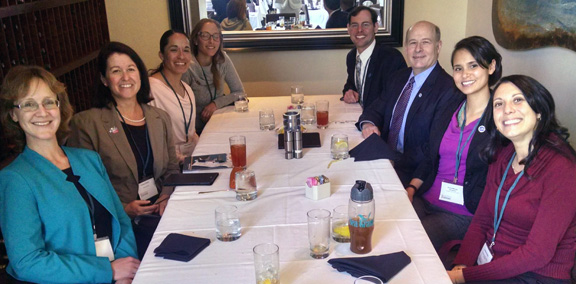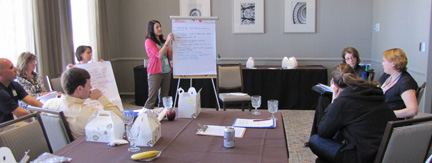Oil Spill Science: The Conversations Continue
– March 3, 2015
Last week more than 1,000 scientists, agency staff, students and others met in Houston, Texas, to continue the conversation about oil spill science at the 2015 Gulf of Mexico Oil Spill and Ecosystems conference.
(From Mississippi-Alabama Sea Grant Consortium / by Larissa Graham) — It was a busy week for our Oil Spill Science Outreach Team but filled to the brim with the latest oil spill science.
Dr. Rick Spinrad, the chief scientist for NOAA, kicked off the meeting with a presentation that focused on the importance of making our communities resilient so they can bounce back from disasters. He shared tools, funding sources and programs that are in place to make that happen and even highlighted the Oil Spill Science Outreach program when he was talking about the importance of sharing the science that is underway with our coastal audiences. Dr. Spinrad also joined our Oil Spill Science Outreach Team for lunch to learn more about the work we are doing!

The latest oil spill science
The various consortia that have been funded by the Gulf of Mexico Research Initiative (GoMRI) presented their latest findings. They are studying topics such as:
-
The movement of oil through the environment and breaks down over time
-
How dispersants work at the surface and at deepwater depths
-
The effect that dispersants had on the Gulf of Mexico and its people, marine life, and habitats
-
How to be better prepared for future oil spills
All of the groups agreed that the science that has been discovered and partnerships that have been created over the last five years will help reduce the impacts of future oil spills.
Our team collects input
Chris Hale, our oil spill science outreach specialist with Texas Sea Grant, and I also hosted a special sciences seminar for natural resource managers that were attending the conference. Dr. Nancy Rabalais, who is the lead for the Coastal Waters Consortium, talked about the impact of oil in marshes. The participants in this session met again, after the conference was over, to talk about what they had learned and to identify gaps in oil spill science. This information will be shared with the Gulf of Mexico Research Initiative Board for ideas for future research priorities.

What’s to come
Scientists have learned much about how oil and dispersant impact people’s lives and the ecosystem over the past five years. With all science, there are some conflicting viewpoints. Some impacts are not as severe as were expected while other discoveries are showing that the impact of oil and dispersants still linger.
Over the next few months, our team will be sharing oil spill science through bulletins and science seminars. Our first series of bulletins will focus on dispersants – why they were used, how they break down over time and how dispersants impact aquatic life.
We are also hosting a science seminar at the Gulf States Marine Fisheries Commission meeting on March 18 in Point Clear, Alabama. Scientists will present the latest fisheries-related research about the impacts that the Deepwater Horizon oil spill and dispersant application had on Gulf of Mexico habitats, communities and individual species. Speakers will include:
-
Dr. Steve Murawski, a fisheries biologist and marine ecologist from the University of South Florida, will be talking about health and contamination in Gulf fishes and the impacts that the oil spill had to the food web and populations of fishes;
-
Dr. Kenneth Heck, who is a marine scientist and professor at University of South Alabama and profession and Chair at Dauphin Island Sea Lab, will be talking about impacts that the oil spill had on the ecosystem and habitats as well as the effect on individual fishes and populations;
-
Dr. Mandy Joye, a biogeochemist and microbial ecologist in the Department of Marine Sciences in the University of Georgia, will be talking about dispersants and their impacts to the open ocean and coastal ecosystems; and
-
Dr. Tracey Sutton, an associate professor at Nova Southern University, will be talking about the impacts that the oil spill had on mid-water fishes, including juvenile reef fishes.
To learn more
If you have questions about oil spill science, please feel free to contact me at Larissa.Graham@auburn.edu or 251-348-5436. If you’d like to learn more about our team, please visit our website or email me to join our mailing list.
GoMRI “In the news” is a reposting of articles about GoMRI-funded research (published by various news outlets). The author’s interpretations and opinions expressed in these articles is not necessarily that of GoMRI.





